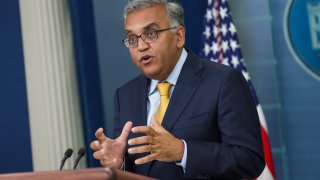
Dr. Ashish Jha has a theory about why, after two years and counting, the Covid-19 pandemic still isn't over.
According to Jha, the White House's Covid response coordinator, scientists and public health officials have mostly nailed the medical response to the pandemic: As experts have learned more about the coronavirus, the U.S. has continually adapted its safety guidelines and treatment plans accordingly.
The problem, Jha said at the Aspen Ideas Festival in Aspen, Colorado, last week, is that those experts often fail to communicate effectively about those shifts — leading many Americans to mistrust the science and turn to social media for health information over publicly appointed doctors and scientists.
"We got the biological science right, but we didn't get the social science right," Jha said.
Get Tri-state area news and weather forecasts to your inbox. Sign up for NBC New York newsletters.
The medical response to Covid has indeed been impressive: In record time, scientists created multiple highly safe Covid vaccines that are especially effective at preventing severe illness, hospitalization and death. New booster shots targeting specific Covid strains — for even stronger protection — are on the path toward federal approval, too.
For those who fall particularly ill from a Covid infection, multiple therapeutic drugs are currently on the market, with more in the development pipeline. Jha directly attributed these advancements to stellar communication within the scientific community.
"The sheer amount of collaboration that happened in the scientific community was unprecedented," Jha said, adding: "That was a major reason we got vaccines and treatments, and all of that was scientists trusting each other to use [each other's] information wisely."
Money Report
But frequent changes to the nation's safety guidelines, particularly early in the pandemic, torpedoed many people's faith in official messaging around Covid — causing them to interpret a large swath of information from public health experts as inaccurate. That mistrust may be keeping some people from getting vaccinated even today, and the country's lagging vaccination rate is a significant reason the virus is still circulating.
Jha highlighted one particularly frustrating fact: The country's initial Covid guidelines weren't even based on the coronavirus itself. The virus was too new for scientists to know much about it yet, so public health agencies crafted their recommendations from their knowledge of a seemingly comparable virus: the flu.
The inability — or unwillingness — to communicate that fact in those early pandemic days could have far-reaching consequences, Jha said: "I think what we should've done is say, 'We don't know how this virus spreads. Our mental model is influenza. Here's how influenza spreads and this is why right now we say this."
Such an approach could have left more room for experts to change guidelines while maintaining the public's trust, Jha said.
"You're not going to get it right on the first draft," he explained. "I think that's OK. But you need to explain to people why you changed your mind and why you were so sure initially ... Explaining your level of confidence and then explaining how you're going to go verify are important parts of the message."
A similar pattern played out when Covid vaccines became available to the general public in early 2021, Jha said: Because public health experts assumed that most Americans would want to get vaccinated immediately, they focused their messaging on what they didn't yet know about the vaccines, rather than what they did know.
"Most scientists went out there and said, 'We have no idea whether these vaccines reduce transmission or not.' And most Americans heard, 'These vaccines don't reduce transmission,'" said Jha. "Because we weren't sure, we led with, 'We don't know,' which was assumed to mean 'no.'"
Going forward, Jha said, public health officials — including himself — should make concerted efforts to lay everything out on the table. Often, he said, people don't necessarily need certainty. They need a judgment call from a trusted source.
"Science is a journey. Science is a process," said Jha. "And that I think has not been clearly communicated to people."
Sign up now: Get smarter about your money and career with our weekly newsletter
Don't miss:
- Omicron-specific Covid vaccines could finally be here this fall—here’s what you need to know
- Covid fatigue is making the pandemic worse—and prolonging its end, experts say






